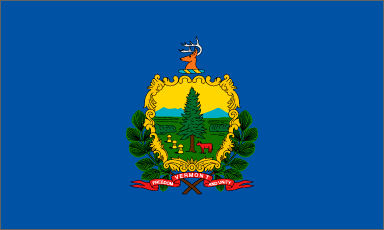Legal Vermont Poker & Gambling Laws

Is Online Poker / Gambling Legal in Vermont?
Vermont gambling laws disallow gaming of any sort, except for the official state-run lottery and certain forms of charitable gaming. Vermont is the 2nd least populous state in population, though it is 20th ranked by median income. Though Vermont has a stagnant economy, it's unemployment is among 5 to 10 lowest among US states. IBM is the leading single employer in Vermont (outside the state itself), while tourists (often from nearby New York State) visit the Green Mountains for camping, hiking, and skiing, so tourism is a big part of the economy.
This is interesting, since Vermont could make significant income off of out-of-state tourists playing at casino resorts, if the state government allowed it. Vermont's citizens therefore leave a significant amount of money on the table, taking an anti-gambling stance. Vermont gaming laws are enforced by the Vermont Attorney General's Office.
Playing Legal Poker in Vermont
If you're looking for a way to play poker for real money while remaining in compliance with Vermont law, you may have fewer options that you think. Let's quickly discuss where poker falls with regard to Vermont's definition of gambling and then explore the common options players have for legal poker and their status in Vermont.
Vermont's definition of gambling is located in Chapter 51 of the state code. Skip to section 2141 and you'll find that gambling is basically winning or losing a valuable thing at "any game." While proponents of poker can argue that poker isn't gambling, it's tougher to argue that poker isn't a game. Therefore, betting on poker in Vermont would seem to readily meet the state's definition of gambling.
Of course, Vermont does allow some forms of gambling via statutory exceptions granted to things like the lottery. Which, if any, of these apply to poker?
Try as you might, you won't find commercial casinos (or their tribal peers) within Vermont's borders, so live poker rooms are off the table. Better news on the charitable gambling front: If games - including poker - are conducted in accordance with Section 2143 of Vermont state code and regulations issued by the State Attorney General, then those games are totally legal in Vermont.
We'll wrap up by quickly discussing home poker games in Vermont. Here the law lacks clarity; there is no express exception in Vermont law for social gambling. But some of the charges related to gambling read as if they only apply if you're gambling in a commercial establishment, not a private home. Those with practical questions on this issue are advised to review the code personally or to contact the State AG for further information on how Vermont law applies to home poker games.
Charitable Gaming Laws in Vermont
Vermont is among the top 10 states in charity volunteering, so it should come as no surprise that charitable organizations are given some leeway in raising funds through raffles and other games of chance. In fact, a significant amount of Vermont gaming law is written to detail how charitable gambling will be regulated.
Laws against Stakes Wagered
In Section 2141 of the Vermont state legal code, it stipulates that people who win or lose money (or bet) on play or hazards can be fined between $10 and $200 for their offenses. If you get bet on the outcome of an event or you share in the stakes on those events, whether you end up winning or losing, you can be fined if you're found guilty.
Nonprofit Organizations and Casino Events
Nonprofit organizations get some exemptions in Vermont. This includes charitable, educational, civic, fraternal, or religious organizations who use raffles, lotteries, or other games of chance to raise funds. These organizations cannot use gambling machines or mechanical devices for this purpose. Any given locations is limited to one "casino event" in a calendar quarter and three casino events in a year's time. No two events can be scheduled within 15 days of each other. If a charitable organization owns a location, they can have no more than 12 casino events every year or 3 such events in a calendar quarter. Also, the location cannot have 15 or less days between events. The organization itself cannot have more than 1 casino event per quarter or 3 events per calendar year, with the same fifteen day stipulation in effect.
If you're wondering what a "casino event" is defined as by Vermont state code, this is any gathering held during a 24 hour period where a game of chance is conducted. Break-open tickets, lotteries, raffles, and bingo games are not considered such events. The previous stipulation is meant to define those games held at fairs, field days, bazaars, and "chuck-a-luck" games events. Chuck-a-luck or birdcage is a three dice game similar to sic bo which is considered a carnival game. Birdcage is sometimes used for charity fundraisers.
Learn About Other State Laws
Vermont Lottery Commission
The Vermont Lottery Commission oversees the Vermont State Lottery, the official lotto game for Vermonters. The Vermont Lottery offers games like Hot Lotto Sizzler, Lucky for Life, Tristate Megabucks Plus, and Pick 3. The Green Mountains State is also a member of the Mega Millions and Powerball multi-state lottery associations, so people can buy these lottery tickets in venues throughout the state.
